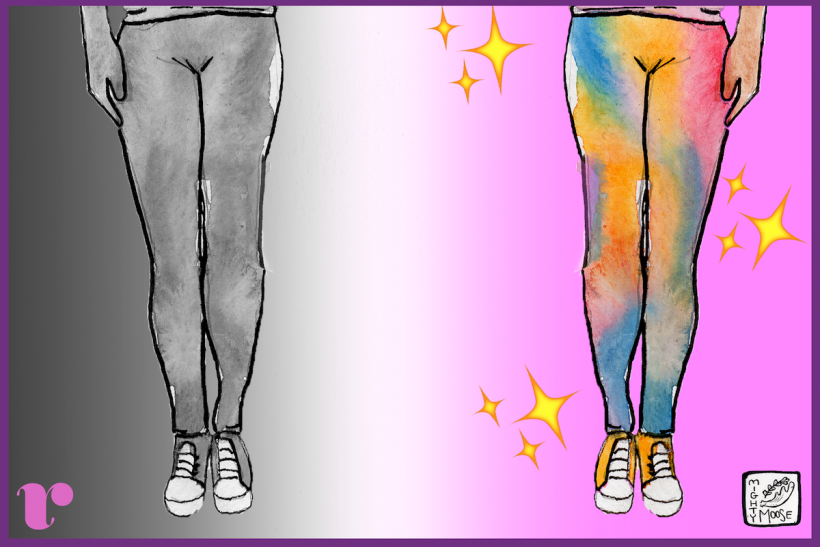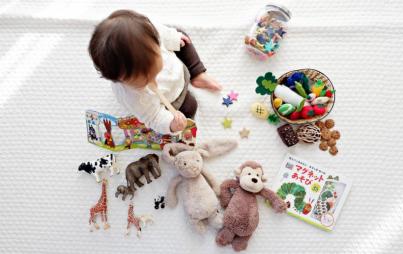
I had a dream about writing this. In my dream, I got an email from one of the Ravishly editors, someone who I’ve worked with before but who didn’t assign me this piece. The email popped up in my Gmail inbox, alerting me with a little bold (1) that I had to open and read it. The message was something to the effect of: “Hey Alaina! I see you didn’t turn in your piece to Jenni on time, which was due yesterday. We’re going to have to remove you from the schedule permanently, effective now.”
I have ADHD and I’m autistic, and completely forgetting to turn in something that is due is one of my biggest fears. It’s one thing for me to need to ask for more time — it happens to the best of us, even with meticulous planning, because some days the WiFi goes out or you’re stranded at the hospital with your best friend who has chest pains or you get rear ended at a stop sign — but it’s another thing to completely forget that a task is due and have the deadline pass.
In elementary school, I struggled with this a lot. I missed so many deadlines that I stopped trying to pass my homework in on time, and then I stopped trying to pass it in at all.
A couple weeks ago, I was packing my boxes to move into a new apartment and I found my school records. The manila folder is filled with early education report cards that mark me as inattentive, disorganized, hyperactive, loud, and disruptive. One of my kindergarten teachers “strongly recommended” occupational and speech therapy. Another commented on my difficulty understanding concepts. Many of the reports have a similar theme: Smart but can’t stay still. Has potential, but lacks the ability to put that potential into action.
The education system isn’t designed for students like me. From as early as preschool up through my master’s degree, I struggled in a traditional classroom setting for a few reasons, and needed to adapt my own methods of surviving education.
Many teachers aren’t prepared for different learning styles.
I was fortunate to have a few one-on-one tutors early on who helped me with reading and math, but most teachers are managing an entire classroom. It makes sense that they can’t adapt their teaching to every individual student. As someone who’s autistic and has ADHD, I had a hard time in a wide variety of classroom settings. I’m still hyperactive — despite the common myth that kids with ADHD “grow out” of this, particularly AFAB kids — but it was even more prominent when I was younger and hadn’t yet developed my own ways of dealing with this.
Teachers punished me for learning differently, instead of helping me embrace it.
There’s a lot of talk about fidget spinners in the media lately, but this is a serious issue for autistic people and those with ADHD. Even as an adult, I have a seriously hard time sitting still for an entire eight hour day. My mind is often on overdrive, and like many people with autism or ADHD, I stim frequently when I’m sitting down.
The way I like to explain it is this: I have a lot of energy most of the time (except when I’m really drained or overtired). I have even more energy if I’m excited or nervous about something. I have the most energy when I’m being creative, and I work in publishing, where I’m encouraged to be creative. I’m practically bursting at the seams when I’m in a creative mood. Ideally, I’d be able to get up and dance, walk around, pace, jump up and down, and otherwise use physical exercise as a release. At the very least, I need to be able to stim, which for me usually looks like flapping my hands and feet, or dancing in my seat.
The problem is that classrooms aren’t made with these actions in mind. As a kid, I was often punished for being disruptive if I wanted to get out of my seat and walk around while I was thinking about ideas for a science experiment, or trying to understand a historical concept. Before the days of fidget spinners, I brought my Polly Pocket strawberry house with me to school on a long necklace and played with it whenever I needed to — until my second grade teacher confiscated it.
Many of my teachers refused to understand that stimming, doodling, and getting out of my seat during class were actually positive for me — it helped me focus my mind and understand what I was learning.
Teachers punished me for learning differently, instead of helping me embrace it. The teacher who took my Polly Pocket away also banned me from field trips, barred me from using the bathroom more than once a day, took away class privileges, and tried to get me held back for another year in second grade. She wasn’t willing to see that I’m interested, curious, and talented, if you’re willing to deal with the fact that I learn and communicate differently. Like many autistic people, my brain automatically wants to info dump: If someone asks me about one of my favorite subjects, a question as simple as, “Who decides what to put on a book jacket?” can lead to an hour-long monologue about the book publishing industry, and I can talk about season three of The Vampire Diaries for days. Similarly, because I have ADHD, sometimes I have trouble focusing, but other times, I fall into an intense hyperfocus where I’ll spend hours learning everything I can about graphic design, until I look at the clock and realize it’s two in the morning and I’ve been on my laptop almost all night.
Instead, teachers should work with students to figure out what our strengths and weaknesses are. I’m not great at spatial awareness or diagramming a sentence, but I’m an extremely fast reader and I could spend hours on a crafting project like making a gold leaf quote frame. I appreciated my teachers most when, instead of punishing me for what I have difficulty with, they were willing to adapt the lesson so it was easier for me to learn. My math tutor taught me songs to learn the multiplication tables after she realized that the simple memorization “eight times nine is seventy-two” style wasn’t working. To this day, if I need to multiply small numbers without a piece of paper, I use my fingers and sing the little song until I get it right.
I remember feeling like my teachers didn’t believe in my abilities, and doubting that I’d be able to make it through high school, let alone college.
I was lucky to have a few teachers and parents who advocated for me, but I also did a lot of my own adapting when classroom styles didn’t work for me. I failed fifth grade English because I couldn’t figure out the parts of a sentence or explain what a comma splice was, even though I was my friends’ top choice as a peer editor because I excelled at editing their mistakes into clean copy. During graduate school, I even took a copy editing course just to challenge myself and get over my fear of sentence diagrams; it was my lowest grade in grad school, but my first B+ in copy editing. Despite being great at the exams and assignments where we had to copy edit a real piece, I couldn’t explain why a comma should go where it does. I still can’t, and that’s okay.
When teachers support this kind of adaptive learning, it creates an accessible classroom. It would be ideal if these kinds of adaptations existed from the beginning, but at the very least, teachers should recognize that students sometimes know our own limits and strengths best, and that we’ve figured out what works for us. If a student always doodles during lectures, it’s possible that — like me — that’s a form of stimming for them, and if they stop, they’ll actually stop paying attention to what’s being said. They might be using the doodles as a mental cue to remember what they’re learning and come back to it to study later. If someone finds it really tough to write a book report, it might be worth asking them to present one orally instead, and vice versa; some students don’t perform well in a discussion-style class where they’re expected to react to what others are saying in just moments, and could really benefit from the ability to write down their thoughts and turn them in.
While I was looking through my old report cards, I couldn’t help but think of all the education professionals in my early school years who didn’t even try to understand me. I remember feeling like my teachers didn’t believe in my abilities, and doubting that I’d be able to make it through high school, let alone college. I had to create many of my systems, like the organizational tools that keep me from missing deadlines now, on my own through years of practice and figuring out what works. But I want every classroom to be as inclusive and accessible as possible, because disabled students aren’t just an afterthought. We’re capable of greatness.








